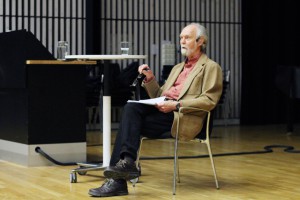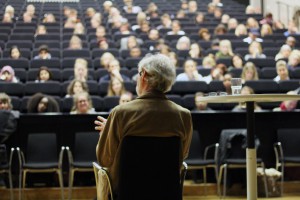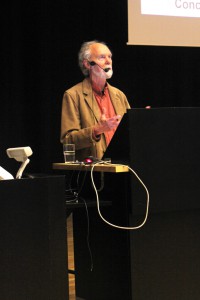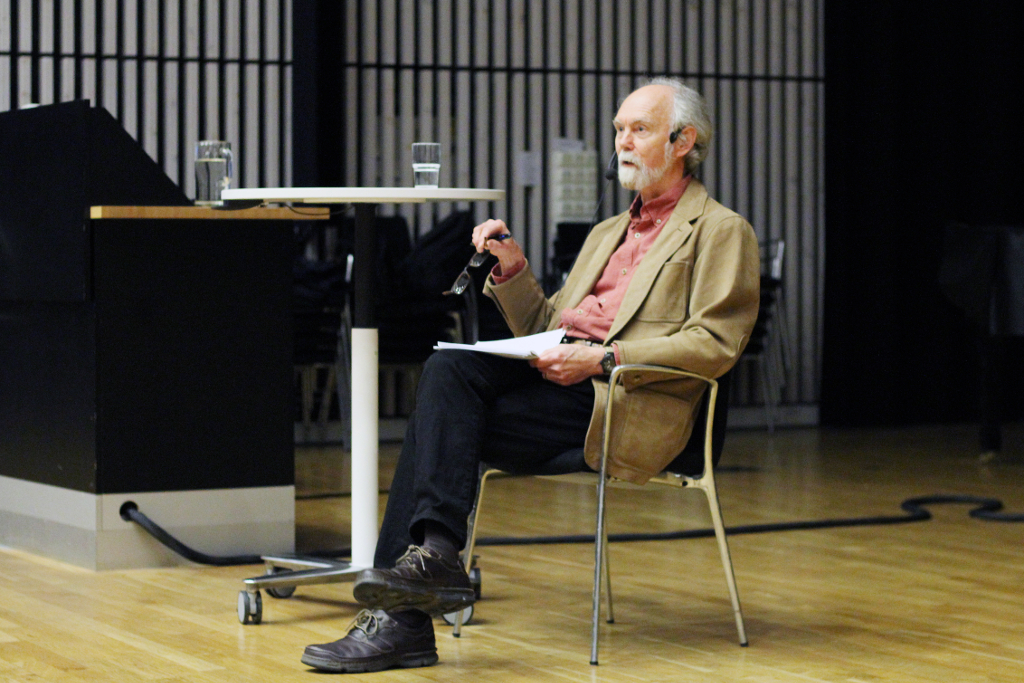Acclaimed author in the field of International Relations, Professor Barry Buzan recently spoke at Malmö Högskola on the topic of ‘Geopolitics and Geoeconomics in the Emerging World Order’. Prior to that fascinating lecture, Luke Richards and Suzanne Snowden from the Pike and Hurricane had the opportunity to ask him about the many publications he has been working on.
LR: In your book “The Global Transformation” you credited Justin Rosenberg for “showing the way”. Having studied at Sussex, I think Justin is a forward thinking scholar, but how important is history to you in understanding international relations?
BB: To me it is extremely important, in the sense that the understanding I eventually arrived at was that most of what passes for mainstream IR theory is just an abstract version of Western history. Since Western history became world history it does in some senses work, but also the interests in “where is the non-western IR theory”? If all of this had started in China it sure wouldn’t look like it looks now, there would be IR theory, but there would not be IR theory as we know it. So I think history is foundational and the attempt to forget that much of the theory we have in IR is actually just an abstract from history, to kind of pretend this abstract history theory is methodical is all wrong. Therefore that book is very much aimed at trying to introduce a dynamic sense of history into the teaching of international relations.
LR: Since you have started your career, when have been the biggest changes in international relations theory?
 BB: That’s actually a surprisingly difficult questions to answer, because there’s has been a lot. I mean when I started out there wasn’t all that much in the way of IR theory as such, it was basically different versions of realism and something called utopianism or idealism and that was about it. So there have been many revolutions and attempted revolutions along the way and IR has now become, in some senses ridiculously diverse theoretically, unlike most disciplines, function based disciplines. It doesn’t have a core theory, it has a whole nest of theories that fight amongst themselves whether their commensurable or not. I don’t find that problematic, partly because I’m not very interested in the kind of philosophy of science issues, I’m rather pragmatic and it seems to me that the diversity of theories is kind of…in the sense that you pick the theory according to what type of question you want to answer and what you are interested in and different theories can do different things. None of them can do everything and they can be mixed up to a point. There are bits of this that attract me. I’m not terribly attracted to the quantitative statistical side of things, I’m not terribly attracted to the postmodern deconstructive side of things, but there are aspects of both of those that I think work and are valuable. In that sense I’ve been happy to see the theoretical toolkit of IR grow and expand and I don’t find that particularly problematic as I’ve been part of that myself. There is an overview there I’m certain but I don’t think I want to go inside that and start picking things apart. Part of it is just a matter of personal preference and what you are intellectually inclined to and, up to a point, what you are trained to do. I wasn’t trained in the mathematical arts and so that side of things is difficult for me, I’d have to learn another language in order to do it.
BB: That’s actually a surprisingly difficult questions to answer, because there’s has been a lot. I mean when I started out there wasn’t all that much in the way of IR theory as such, it was basically different versions of realism and something called utopianism or idealism and that was about it. So there have been many revolutions and attempted revolutions along the way and IR has now become, in some senses ridiculously diverse theoretically, unlike most disciplines, function based disciplines. It doesn’t have a core theory, it has a whole nest of theories that fight amongst themselves whether their commensurable or not. I don’t find that problematic, partly because I’m not very interested in the kind of philosophy of science issues, I’m rather pragmatic and it seems to me that the diversity of theories is kind of…in the sense that you pick the theory according to what type of question you want to answer and what you are interested in and different theories can do different things. None of them can do everything and they can be mixed up to a point. There are bits of this that attract me. I’m not terribly attracted to the quantitative statistical side of things, I’m not terribly attracted to the postmodern deconstructive side of things, but there are aspects of both of those that I think work and are valuable. In that sense I’ve been happy to see the theoretical toolkit of IR grow and expand and I don’t find that particularly problematic as I’ve been part of that myself. There is an overview there I’m certain but I don’t think I want to go inside that and start picking things apart. Part of it is just a matter of personal preference and what you are intellectually inclined to and, up to a point, what you are trained to do. I wasn’t trained in the mathematical arts and so that side of things is difficult for me, I’d have to learn another language in order to do it.
LR: Speaking about the diversity of international relations, do you not find this a problem at all, do you not see the discipline moving towards a grand unified theory of IR?
BB: No I don’t and I’m not too bothered about that. I’m pretty old fashioned now and therefore I like grand narratives and other things which are beyond the pale for some sections of the IR community. I’ve got nothing against attempts at grand unifying theory but I mean that’s my own preference. I’m a kind of high flyer in the sense that I like to look down upon the world from a high altitude. In the extent that I have any talent, that’s where it lies. That’s my natural area and one reason why the English school was attractive, you can pretty much do anything within the English school within a certain framing. I’m not troubled by that, I think you need to be very clear within your work what theoretical framings you are using and what you’re trying to combine and not combine and what the difficulties with that might be. You will notice if you paid any attention to my opus as a whole that I co-author a rather unusually large amount with an unusually wide cross section of people and I find that an extremely good way at coming to grips with the theoretical diversity. Ole Weaver was very much post structuralist, that was his background training, and that was the same with Lene Hansen and I learned a great deal from them and George Lawson. George is a historical sociologist, he’s given me a crash course in sociology which I’ve never studied. So co-authoring, although in some ways inefficient, is extremely efficient if you want to widen your theoretical scope and learn something fast and deep from somebody else.
SS: I loved reading that about you. I read about the fact that you’ve co-author so much that you almost saw it as a third person in the sense that you each had the different perspectives of what you wanted to work on and combined, it was a third perspective you may not have had on either of your own.
BB: Yeah, it makes me a bit schizophrenic. If you place a high value on the consistency and the coherence of your opus then this is troublesome. I don’t, I mean you do different things with different people and then you are different people for those purposes. I think that’s a fair way of approaching it. I don’t know whether I’ve set a record for the number of people I’ve co- authored with or not, there are plenty of co-authoring partnerships around.
SS: My question then is if you had to co-author another book, who would your ideal person to co-author with and on what?
 BB: Well, I can answer that in triplicate as I am working on 3 books at the moment. It depends on the book basically, Lene was the perfect partner for the book on the evolution of international security studies because we had the Copenhagen School in common and we knew each other very well, so we had a kind of middle ground on which we had shared ground that we could use as a kind of benchmark, and then she covered most of the post structuralist and feminist stuff much better than I did. I had to teach her about the ex post, ex ante dilemma and all of that, and she had to teach me about all of the other stuff. That was great, so it was a very efficient and effective partnership. The same with George on the 19th century book, we both had an interest in the 19th century but we came to it from very different directions. The books I’ve got underway now is one with Evelyn Goh which is about the history problem in north East Asia, particularly between China and Japan. I could do that by myself, that’s dangerous work. I mean I’d never get invited back to China once it hits the presses. There were quite a few people I’d thought about doing that with, but she was enough of an outsider, but also enough of an insider to be safe in the sense she could take that risk. Whereas there are various people both inside China and out, who couldn’t…or whom I would not wish to subject to that risk. And I think she’s incredibly smart and bright. I like everything she’s done, I’ve worked with her a bit and I know she’s good. I teamed up with a former PHD student of mine to do a rather theoretical nerdy book on the idea of international society at the global level and what that might mean. There’s a good division of labour between him and me on that, that’s essentially an intellectual division of labour. The idea is to get a slightly wider perspective of the topic, because he’s much younger than me obviously and sees these things in a different way. And the third one is with Yongjin Zhang who (in 1998) wrote a book on China and International society which took it up to the late 90’s. So he and I are working on not quite a successor to that book, but in a sense maybe with a little bit of a twist on it. We’ve written together as well and worked together quite a bit so we know where we stand. He’s not done any co-authoring before, so he’s got to learn how to do it, and wants to. That’s a good partnership as well. At my age I also have this, I don’t want to play the old fart too much, but I’ve got some problems with my eyes and I’ve not seen too many people still at the top of their game in their mid-70’s. I don’t know when the top of my game passes by as it were. But there becomes some possibilities that if I start on long term projects I won’t be able to finish them for one reason or another, therefore having a co-author alongside is some guarantee that it gets finished in some way.
BB: Well, I can answer that in triplicate as I am working on 3 books at the moment. It depends on the book basically, Lene was the perfect partner for the book on the evolution of international security studies because we had the Copenhagen School in common and we knew each other very well, so we had a kind of middle ground on which we had shared ground that we could use as a kind of benchmark, and then she covered most of the post structuralist and feminist stuff much better than I did. I had to teach her about the ex post, ex ante dilemma and all of that, and she had to teach me about all of the other stuff. That was great, so it was a very efficient and effective partnership. The same with George on the 19th century book, we both had an interest in the 19th century but we came to it from very different directions. The books I’ve got underway now is one with Evelyn Goh which is about the history problem in north East Asia, particularly between China and Japan. I could do that by myself, that’s dangerous work. I mean I’d never get invited back to China once it hits the presses. There were quite a few people I’d thought about doing that with, but she was enough of an outsider, but also enough of an insider to be safe in the sense she could take that risk. Whereas there are various people both inside China and out, who couldn’t…or whom I would not wish to subject to that risk. And I think she’s incredibly smart and bright. I like everything she’s done, I’ve worked with her a bit and I know she’s good. I teamed up with a former PHD student of mine to do a rather theoretical nerdy book on the idea of international society at the global level and what that might mean. There’s a good division of labour between him and me on that, that’s essentially an intellectual division of labour. The idea is to get a slightly wider perspective of the topic, because he’s much younger than me obviously and sees these things in a different way. And the third one is with Yongjin Zhang who (in 1998) wrote a book on China and International society which took it up to the late 90’s. So he and I are working on not quite a successor to that book, but in a sense maybe with a little bit of a twist on it. We’ve written together as well and worked together quite a bit so we know where we stand. He’s not done any co-authoring before, so he’s got to learn how to do it, and wants to. That’s a good partnership as well. At my age I also have this, I don’t want to play the old fart too much, but I’ve got some problems with my eyes and I’ve not seen too many people still at the top of their game in their mid-70’s. I don’t know when the top of my game passes by as it were. But there becomes some possibilities that if I start on long term projects I won’t be able to finish them for one reason or another, therefore having a co-author alongside is some guarantee that it gets finished in some way.
SS: So your legacy continues regardless, I love it.
BB: Not that my legacy continues, it’s more that I’ve not wasted all that bloody time and it dies just because I can’t finish it off!
SS: I was fascinated to see your collaboration with the Chinese, I lived in Asia for 5 years myself, in Hong Kong and Beijing. You were saying obviously with China involved it would have been a very different history or slant with IR. What do you see the future of IR being in the next 50 years?
BB: One of the reasons for my engagement with China is that I’ve had for quite a long time, a kind of general aim in what I do to try to internationalize international relations, because it’s a weird disciplined discipline, in lots of ways. It’s not like the other disciplines because it’s kind of scale based rather than function based or time based. I think that trend is going to continue, like the stuff I did with Amitav.
SS: The book? (Non-Western International Relations Theory: Perspectives On and Beyond Asia by Amitav Acharya and Barry Buzan)
 BB: Yeah, the book. It started off as a forum for International Relations in Asia Pacific in 2007. Amitav did most of the work of turning it into the book to his credit. I wasn’t a big believer in the need for a book, but he was absolutely right so he added some papers to it and it has done well. It’s worked very well as a provocation, basically going out and saying “where is your voice in all of this dammit”? Are we right? Are you going to say OK the Western IR theory is the IR theory, or do you have something to say, and if so what is it? That was fun to do as it’s always nice to irritate people, and it did. A lot of people have responding to that in quite major ways. The Chinese of course are doing it quite systematically. They are extremely keen to get their voice in, and one of the things I can do there is help them a bit with that in a sense they haven’t the foggiest idea of how to run an international standard academic journal, as nobody’s ever done it before. Inside China, the environment is rather weird and very different for obvious reasons, but the Chinese journal for international politics is now pretty good. It’s moving up the ranks. I involve myself with everything on the same basis, that we needed to have world class journals edited in lots of different places, not just in the US, and that’s working, I think. So IR is growing fast in all kinds of places. Downstream, you’re giving a 50 year time horizon, I think that in 50 years IR will become much more effectively globalized and other histories will be woven into the Western history and the global history, and that will have an impact on the theories. Because at the end of the day IR theories are all reflective of histories in some way. So whether this will produce novel, unique theories? It might do. I mean, the Japanese got a bit close to that with the Kyoto School stuff which had very different philosophical foundations and at least some of the Chinese IR is working on those very different philosophical foundations that underpin Chinese society and indeed are the same ones that underpin Japanese society in some respects. So there may be some bigger surprises there than one can predict, I’m just not sure. Institutionally I think the discipline will become more global, and that’s a good thing. I’m very happy to see that, I’ve tried to work for that in a variety of ways. Both, to some extent, in academic things like journals and who I write with and what I write about, but to some extent in practical things like politics. There is a world international studies committee which holds conferences and that sort of stuff. It’s slow and it’s small, but it’s going the right way.
BB: Yeah, the book. It started off as a forum for International Relations in Asia Pacific in 2007. Amitav did most of the work of turning it into the book to his credit. I wasn’t a big believer in the need for a book, but he was absolutely right so he added some papers to it and it has done well. It’s worked very well as a provocation, basically going out and saying “where is your voice in all of this dammit”? Are we right? Are you going to say OK the Western IR theory is the IR theory, or do you have something to say, and if so what is it? That was fun to do as it’s always nice to irritate people, and it did. A lot of people have responding to that in quite major ways. The Chinese of course are doing it quite systematically. They are extremely keen to get their voice in, and one of the things I can do there is help them a bit with that in a sense they haven’t the foggiest idea of how to run an international standard academic journal, as nobody’s ever done it before. Inside China, the environment is rather weird and very different for obvious reasons, but the Chinese journal for international politics is now pretty good. It’s moving up the ranks. I involve myself with everything on the same basis, that we needed to have world class journals edited in lots of different places, not just in the US, and that’s working, I think. So IR is growing fast in all kinds of places. Downstream, you’re giving a 50 year time horizon, I think that in 50 years IR will become much more effectively globalized and other histories will be woven into the Western history and the global history, and that will have an impact on the theories. Because at the end of the day IR theories are all reflective of histories in some way. So whether this will produce novel, unique theories? It might do. I mean, the Japanese got a bit close to that with the Kyoto School stuff which had very different philosophical foundations and at least some of the Chinese IR is working on those very different philosophical foundations that underpin Chinese society and indeed are the same ones that underpin Japanese society in some respects. So there may be some bigger surprises there than one can predict, I’m just not sure. Institutionally I think the discipline will become more global, and that’s a good thing. I’m very happy to see that, I’ve tried to work for that in a variety of ways. Both, to some extent, in academic things like journals and who I write with and what I write about, but to some extent in practical things like politics. There is a world international studies committee which holds conferences and that sort of stuff. It’s slow and it’s small, but it’s going the right way.
LR: Speaking of the globalization of the theory, with the emerging global order and with lots of research still done in the US and the UK, is international theory as it currently stands ready to understand the emerging global order?
BB: No, in a word. It seems to me, to put it in a bit of a nutshell, it’s basically the argument in the book The Global Transformation that I did with George Lawson. What we argue is that we’re moving into a structure that we haven’t seen before. It certainly doesn’t fit with the realist polarity theory and all of that and it doesn’t really fit with any of the other stuff either, although it can be seen as a bit of an amalgam. So going back to Justin Rosenberg and Uneven and Combined Development, we’ve been in a system that that has been ever more highly combined and extremely uneven. It seems to me that the combination aspect of that simply goes on forever, we will go on getting more and more combined, denser, more interdependent, more connected, however you want to put it. That seems to me to be a fairly linear thing, so an agenda of shared fates is going to become more and more pressing. On the other hand, the huge inequality of the 19th century is diminishing. So, thus this idea of decentred globalism, which is not the same as multipolarity, it seems to me the whole apparatus of neorealism and neoliberalism just does not work with this. Because it’s not multi-polarity because it’s not working systemically, you would need a system of super powers for that to happen and the diffusion of power is going to be too wide for that. It’s a new structure we are moving into.
LR: If you were a young academic today, trying to leave your English School bias aside, what would you be interested in? Is there anything that stands out?
 BB: I don’t know whether I am going to be able to answer that, I mean, would I not go into the English School? In the sense that it enables you think big that I like, it enables you think historically which I like doing and it enables you think structurally, in a kind of social structural sense, which I like doing. So, that’s where I want to be, I’m not very attracted to the quant methods thing, although some useful work can be done there, I’m happy with the division of labour that leaves that to somebody else. I’m not particularly drawn to most of the “posty” kinds of analysis, although I think some of them are fascinating. I’m glad they’re there but I don’t want to do that myself, it’s not the way I think. So if it’s still me that we are talking about, so probably I’d end up drifting this way. I mean I got into it for very boyish reasons when I was young, in a sense that as a kid and as a teenager I read quite a lot of war stuff, because that was the atmosphere in which one grew up, and I read a lot of science fiction stuff. I liked it because it wasn’t very literary in that sense and the science fiction stuff gave me a taste for thinking big, because it’s like history, the mirror image of history in some ways, and I like that. The war stuff gave me an impetuous into strategic studies and that’s how I got into international relations basically. There were random variables along the way, I was lucky enough to be introduced to the subject by Kal Holsti, a name you may or may not know, still alive and going strong. But he was there was in 1967, teaching the basic intro to IR course which I took, and it was just at the point he had finished turning it into the first edition of his text book, so this was a perfectly honed course and it just blew me away. All of this stuff I had been reading about war and its complexities suddenly was, wow, you could think about this in other ways. So that was a turning point for me in a sense that my eyes were opened and my interests were engaged by a good teacher. That can happen to anybody. You’re lucky if it does, the choices are not only yours. As a young person, where you end up going depends to extent on who you encounter.
BB: I don’t know whether I am going to be able to answer that, I mean, would I not go into the English School? In the sense that it enables you think big that I like, it enables you think historically which I like doing and it enables you think structurally, in a kind of social structural sense, which I like doing. So, that’s where I want to be, I’m not very attracted to the quant methods thing, although some useful work can be done there, I’m happy with the division of labour that leaves that to somebody else. I’m not particularly drawn to most of the “posty” kinds of analysis, although I think some of them are fascinating. I’m glad they’re there but I don’t want to do that myself, it’s not the way I think. So if it’s still me that we are talking about, so probably I’d end up drifting this way. I mean I got into it for very boyish reasons when I was young, in a sense that as a kid and as a teenager I read quite a lot of war stuff, because that was the atmosphere in which one grew up, and I read a lot of science fiction stuff. I liked it because it wasn’t very literary in that sense and the science fiction stuff gave me a taste for thinking big, because it’s like history, the mirror image of history in some ways, and I like that. The war stuff gave me an impetuous into strategic studies and that’s how I got into international relations basically. There were random variables along the way, I was lucky enough to be introduced to the subject by Kal Holsti, a name you may or may not know, still alive and going strong. But he was there was in 1967, teaching the basic intro to IR course which I took, and it was just at the point he had finished turning it into the first edition of his text book, so this was a perfectly honed course and it just blew me away. All of this stuff I had been reading about war and its complexities suddenly was, wow, you could think about this in other ways. So that was a turning point for me in a sense that my eyes were opened and my interests were engaged by a good teacher. That can happen to anybody. You’re lucky if it does, the choices are not only yours. As a young person, where you end up going depends to extent on who you encounter.
By Luke Richards and Suzanne Snowden
Image credit:
Picture 1-4: UF Malmö







